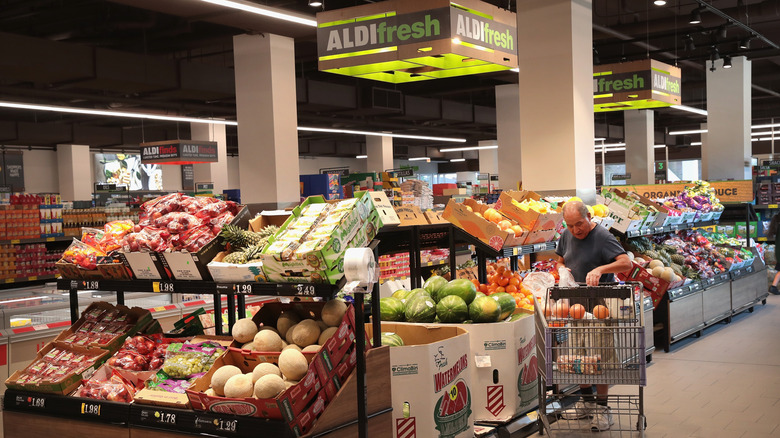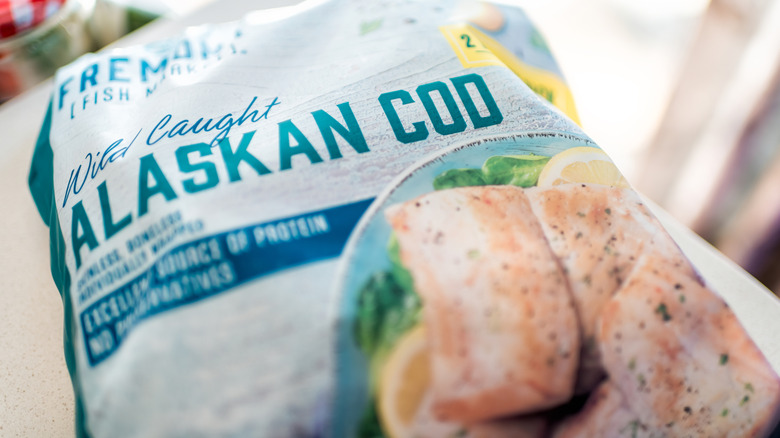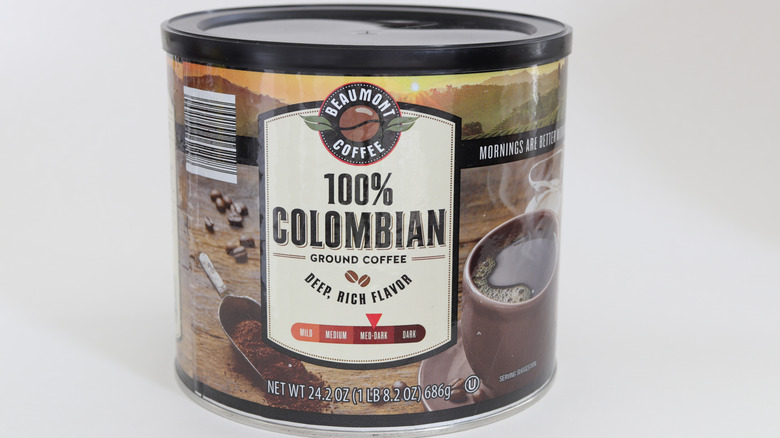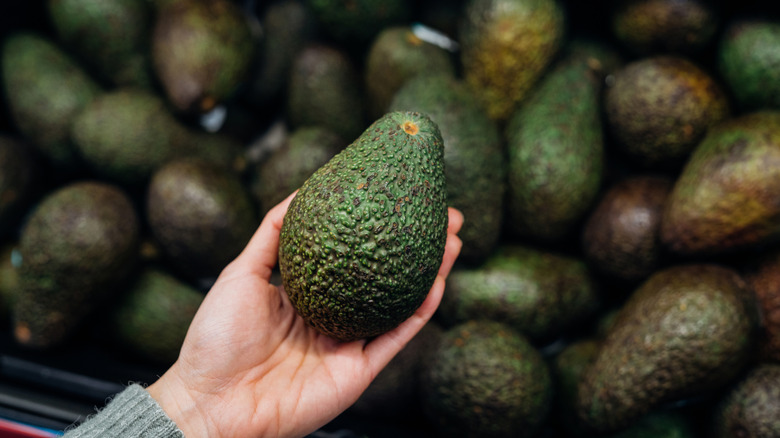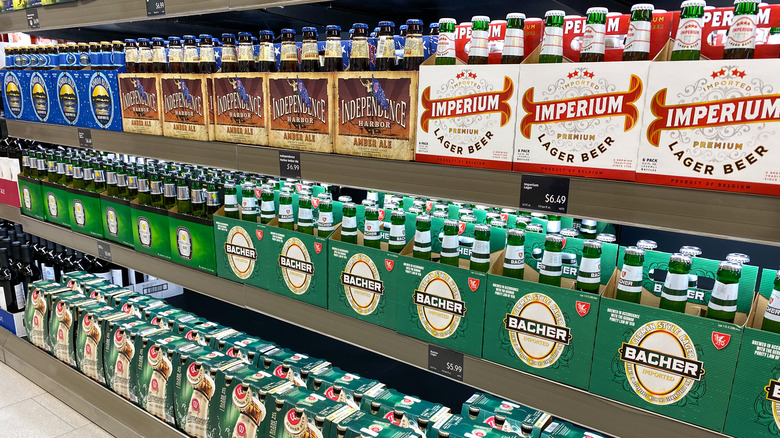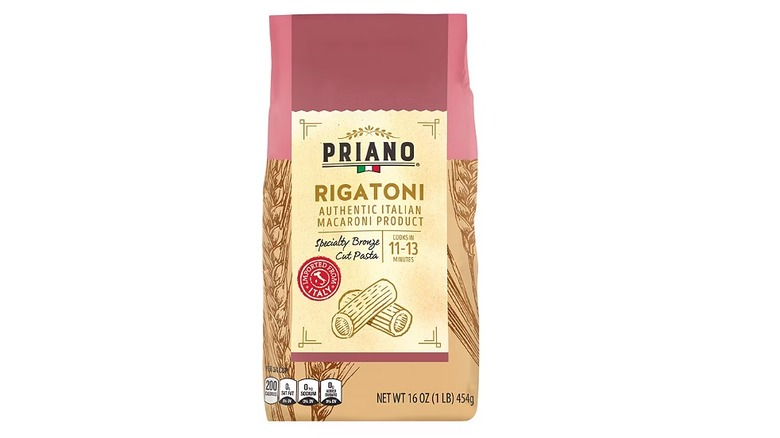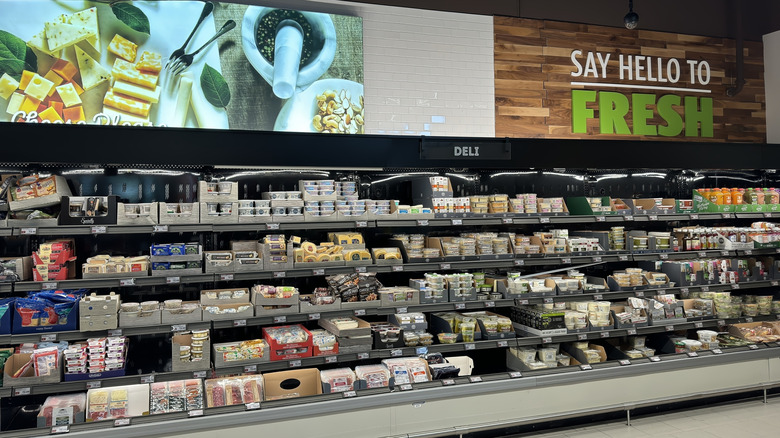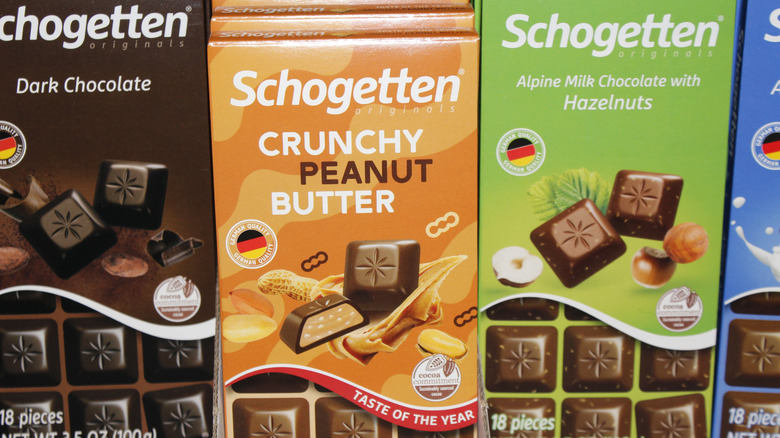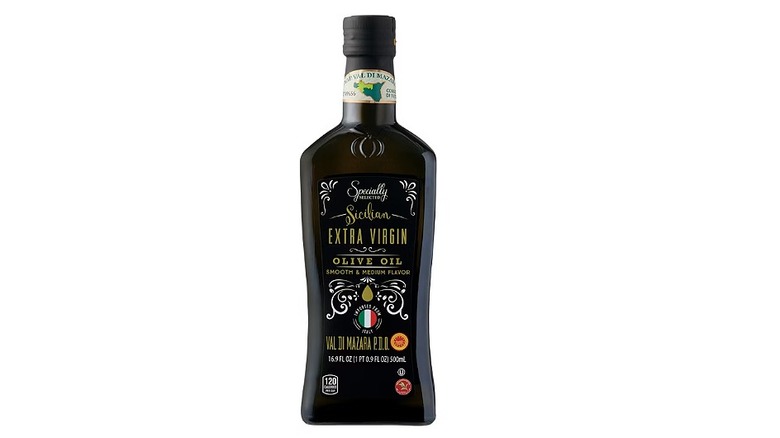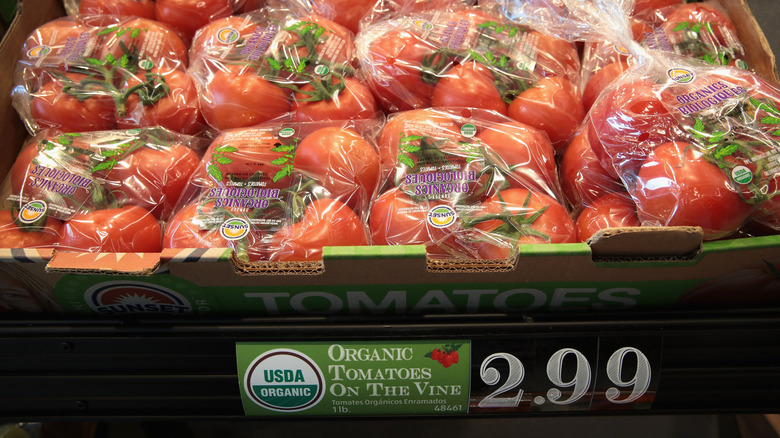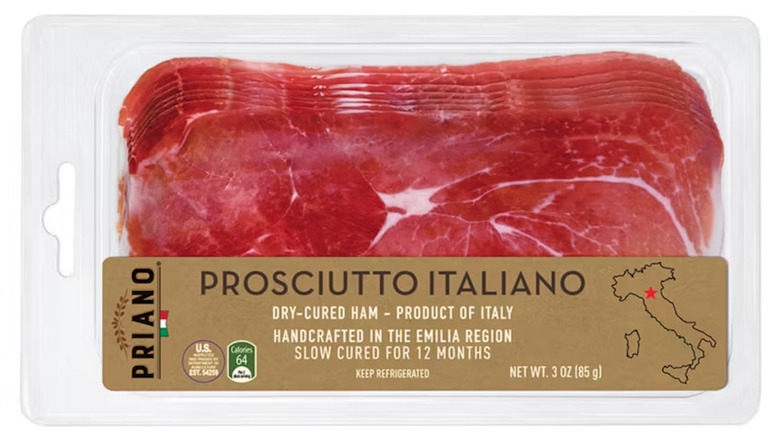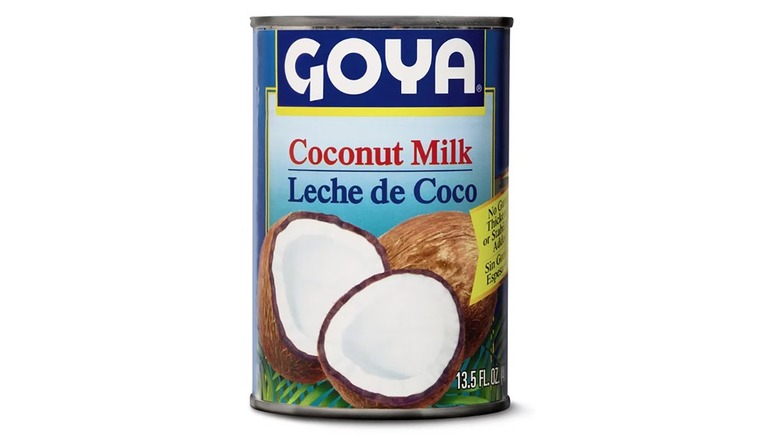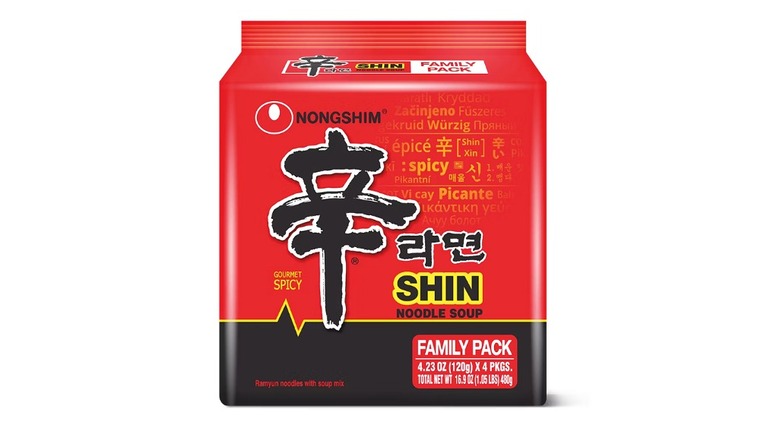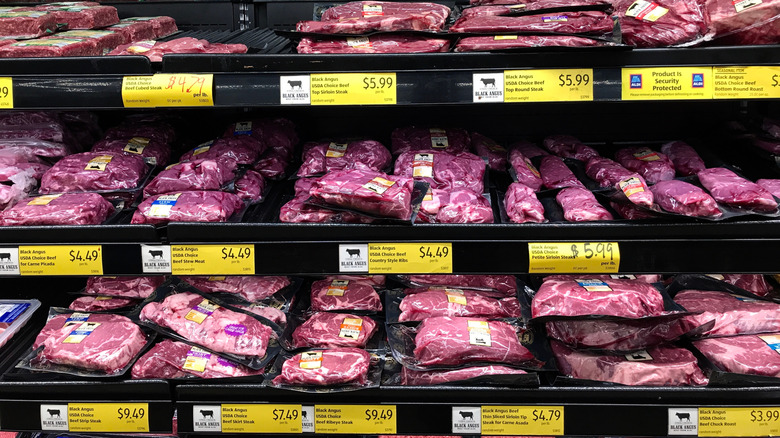13 Aldi Foods That Could Become Pricey Soon
When it comes to grocery stores in the United States, few enjoy the kind of cult following that the German chain Aldi does. According to a recent survey conducted by YouGov, Aldi ranked first in terms of overall popularity among grocery stores, above other heavy hitters like Whole Foods Market and Trader Joe's. It is consistently well-regarded because Aldi tends to be cheaper than most of its competitors.
Part of the reason Aldi is generally more affordable than its competitors is its unique business model. Not only does it keep stores small and limit the number of products it sells, it also saves money on advertising and overhead costs by eliminating bags and limiting the number of employees on staff. Another key to Aldi's success is that it has a two-pronged approach to sourcing its food. While it leans on local purveyors for meat and vegetables, it often sources items internationally, which may soon become its Achilles heel.
Like all retailers, Aldi is not immune to the same market pressures being faced by grocery chains across the country. These include supply chain disruptions, inflation, rising production costs, unpredictable weather, and tariffs. All of these combined with Aldi's distinctive global corporate structure may mean that some of your favorite foods could soon go up in price.
Fish and seafood
Aldi has a robust selection of canned, frozen, cured, and fresh fish and seafood for which it has a pretty solid reputation. The retailer prides itself on its responsible seafood goals, which include eliminating overfishing, bycatch, and ecosystem disruption by 2030. As part of these goals, it maintains memberships in a number of organizations, such as the Global Seafood Alliance, and it carries certifications from the Marine Stewardship Council, Aquaculture Stewardship Council, and more, making it a good choice for consumers concerned with obtaining sustainable fish and seafood.
While there are a number of factors that contribute to the "market price" of seafood, some of the most important ones that may soon influence what you will pay for a salmon filet or a bag of Fremont Fish Market shrimp, for instance, include climate change, overfishing, and tariffs. According to the USDA's Economic Research Service, roughly 80 percent of the seafood consumed in the U.S. is sourced internationally, with Canada, Chile, India, Indonesia, and Vietnam being primary suppliers. Many of these countries are on the list of nations who are facing steep tariffs that may seriously impact the potential availability and cost of fish and seafood to retailers like Aldi.
Coffee
When it comes to a quality cup of Joe, coffee lovers will be pleasantly surprised by Aldi's selection. The retailer stocks a number of unique products under its fair trade Barissimo brand, including whole bean, ground, pods, and cold brew in various flavors, roasts, and from different parts of the world. Though these tend to be more affordable than other top tier brands, coffee in general has been experiencing an unparalleled surge in prices recently.
In January of 2025, coffee prices reached an unprecedented high on the Intercontinental Exchange of $3.48 per pound of beans. While prices have stabilized somewhat, they continue to remain elevated and are poised to spike again due to continued climate concerns, geopolitical unrest, and economic pressures. According to the USDA Economic Research Service, the United States is the second largest importer of coffee globally and roughly 80% of this supply comes from Latin America, with Brazil leading the way in exports.
This means bad news for coffee drinkers if a proposed 50% tariff goes into effect against Brazil on August 1, as reported by CNBC. While the U.S. could import coffee from other countries, tariffs on these nations as well as increased demand could further inflate the cost of coffee beans, adversely impacting consumers who rely on this caffeine source.
Fruit
Though each Aldi location strives to source as much produce as it can locally to keep prices down, this isn't possible in all cases. Some fruits aren't grown in the United States or are only available in limited quantities. A couple of examples of this include bananas and avocados, both of which are predominantly sourced internationally.
According to The Observatory of Economic Complexity, a majority of the bananas imported to the U.S. hail from Guatemala, with Ecuador, Costa Rica, Colombia, and Mexico rounding out the supply. Avocados are in a similar boat, with approximately 90% of the U.S. supply coming from Mexico, as noted by CNBC. Though avocados are grown domestically — primarily in California — doing so is becoming increasingly cost-prohibitive and yield has slowly been dwindling.
Looming tariffs, climate uncertainty, and an increased demand mean these fruits are poised to go up in price drastically. Other items that are likely to see price increases include imported canned, frozen, and dried fruit, like the popular Southern Grove Dried Philippine Mango and the Dark Chocolate Covered Bananas from the Simply Nature brand.
Alcohol
One product that Aldi sells that people may not be as aware of is alcohol. The retailer is quite well-known for its affordably-priced beer, wine, and spirits. Though some of the more popular Aldi finds, like the fan favorite Specially Selected Napa Valley Cabernet Sauvignon, are domestically-grown, many of its offerings are sourced internationally and face serious price increases owing to impending tariffs.
According to data from the USDA Economic Research Service, the United States imports more than $26 billion in alcoholic beverages annually. Almost half of this is in the form of distilled spirits, with beer and wine making up the remaining imports in roughly equal measure. Among distilled spirits, tequila from Mexico has continued to occupy a larger share of the market year-over-year, making a purported 30% tariff on the country a literal buzz kill.
Additional information from the USDA Economic Research Service, notes that Italy, France, and Spain are among the top countries from which the U.S. imports wine. The European Union currently faces tariffs of 30%. Lastly, when it comes to beer imports, several countries slated to be slapped with tariffs of 25% or higher on August 1 are among the top beer producers, including Brazil, Mexico, Germany, Japan, South Africa, Belgium, and Canada.
Priano pasta
When it comes to pasta, Aldi has a brand that isn't only affordable, but has won a number of awards. The Priano pasta brand comes in a variety of forms, ranging from fresh pasta you will find in the refrigerator to dried pasta of various kinds and shapes, including its bronze-cut iterations, which are in a class of their own. Bronze-cut pasta typically costs more than Teflon-cut pasta owing to its superior texture and capacity to cling to sauces. Despite its distinctive quality, the bronze-cut pasta from Priano is often far less expensive than those you may find from other competitive name brands, making it a fan favorite.
Though some of Priano's pasta is produced domestically, others, including a majority of its bronze-die cut pasta shapes, are imported from Italy. As a result, these particular types of pasta may soon be less of a deal than they have been thanks to the impending 30% tariff on the European Union. Consumers may need to pay close attention to those Priano brand pastas that are made in the United States and forego the higher-quality, premium, bronze-cut variety once the tariffs are implemented on August 1.
Cheese and dairy products
One of the most potentially hazardous departments to your pocket book at Aldi is its dairy case, not because the items within it are expensive, but because they are so diverse that it's hard to resist stocking up. Among the more tempting dairy case items is an expansive selection of imported cheeses sold under the Specially Selected label and the pure Irish butter from Countryside Creamery that is a dynamite facsimile for the more well-known and pricey Kerrygold brand.
When it comes to cheese specifically, the United States imports a significant quantity of it from Europe, to the tune of $1.95 billion in sales in 2024 alone, per The Observatory of Economic Complexity. The top resources for this cheese include Italy, France, Spain, the Netherlands, and Switzerland, all of which are poised to be slapped with a 30% tariff on August 1. This could not only impact cheeses and other dairy products sourced from these countries, it may affect domestically-produced ones as well.
While it would seem that higher prices on imported cheese would drive increased sales on products manufactured in the U.S., many of these are also produced using European cultures and molds, which may directly influence the cost of cheeses made in America. Additionally, some cheeses simply cannot be manufactured here, especially those that enjoy Protected Designation of Origin status within the European Union. Either consumers will opt to forego these cheeses altogether or they will be forced to pay a premium for them.
Chocolate
Another area where Aldi excels is in its vast selection of chocolate, most of which are sold under the Schogetten, Choceur, and Moser Roth brands. While Aldi does carry some domestically-sourced brands, its primary ones are all of European origin, hailing from either Germany or Belgium. While this is the reason the chocolate is so superior, (European chocolate is made using more efficient production methods and a higher ratio of cocoa-to-sugar), this may also become problematic in terms of cost with increased tariffs on the European Union.
Unfortunately, even if you opt to purchase domestically-produced chocolate, you will likely pay more in the near future. This is partly because roughly two-thirds of the world's cocoa bean supply comes from Ghana and the Ivory Coast in Africa. Not only are smaller nations in Africa also facing a 10% tariff, which would affect the cost of manufacturing chocolate in the United States, there have been a host of ongoing issues that have been slowly driving up the cost of cocoa over the past several years.
According to Al Jazeera, in December of 2024, the cost of cocoa beans hit an all-time high, and, while prices have stabilized somewhat, underlying factors leading to this initial spike continue to plague the chocolate industry. These include climate change, disease, illegal gold mining, and laws preventing deforestation. These combined with tariffs, increased consumption, and a fragile geopolitical environment will likely hit the grocery aisles at Aldi in the not too distant future.
Olive oil
Though Aldi doesn't have a large inventory of olive oil, it does sell a few varieties, including a Sicilian import under the Specially Selected label that is certified P.D.O. Quality olive oil is one of those things that is hard to come by under any circumstances, especially the extra virgin varietal. Many olive oil brands utilize dubious practices, bottling subpar olive oil that has been adulterated and slapping a deceptive label on it, while others are packaged in containers that make the oil susceptible to degradation.
Any supply chain disruptions or geopolitical pressures can adversely impact an already fragile market, driving up prices. In the past several years, olive oil prices have been going up steadily due to climate pressures reducing inventory, including an unprecedented heatwave and droughts that decimated Spanish olive oil production. This paired with an increased demand for quality oil has made finding a decent bottle of this commodity quite challenging.
As noted by the International Olive Council, the European Union supplies a majority of the olive oil in the United States, with Spain and Italy leading the way. Now tariffs on the European Union threaten to disrupt olive oil prices even further, potentially driving them up to record highs.
Tomatoes
Tomatoes are a central part of our daily lives. They are foundational ingredients to many of our favorite condiments, including salsa and ketchup, feature in pasta sauces, and are sold in both fresh and canned iterations. While some of the canned tomatoes sold at Aldi specify they are domestically-grown, the reality is that 70% of the tomato supply in the United States is imported from Mexico. This means every grocer this side of the border is poised to be impacted by the recent dissolution of the Suspension Agreement, which has been in place since 1996.
The initial agreement was established to prevent Mexico from dumping its tomato supply onto the American market, thereby deflating the prices and making it difficult for domestic producers to get a fair market value for their crop. It has also ensured a steady supply of tomatoes to consumers, particularly of the vine-ripened variety.
On July 14, the United States government instituted an immediate 17% duty on Mexican tomatoes, nullifying the Suspension Agreement and leaving markets reeling. While the hope is that this will encourage an increase in domestic production of tomatoes, it will take time for supply to catch up with demand. In the immediate future, this means higher prices for all tomato-based products.
Cured meat
Along with its impressive selection of cheeses, Aldi has a dizzying array of cured meat for sale. While many of these are produced domestically, some, like the prosciutto and speck from the Priano brand, are sourced internationally, particularly from Italy. Italy is well-known for the superiority of its cured meats. Many of these are produced under strict P.D.O. standards, which dictate not only which breed of pig can be used, but how the meat is cured and for how long. This generally translates to meat that is more delicate in flavor and texture, and therefore more expensive.
These prices are about to go up exponentially owing to the proposed tariffs on the European Union. The United States ranks third in overall imports of Italian cured meat, and tariffs could negatively impact an already fragile market that has been tested by supply chain issues resulting from the African swine fever. Any further challenges could mean not only higher prices, but less availability of what is often considered to be a luxury item.
Coconut milk, oil, and water
Coconut is an ingredient used in the manufacturing of a plethora of products, from consumables to cosmetics. It's also transformed into a number of key items that can regularly be found at Aldi, including milk, oil, and water. Many of these have long been the subject of contention due to the nature of where this fruit grows and how it's sourced. Not only have there been questions relating to the sustainability of coconut, issues with child labor exploitation and animal cruelty have also been reported.
Nestlé, among other companies, have made a concerted effort to address these and to make their supply chain traceable. That said, this can be increasingly challenging due to the volatile market. A majority of the coconut supplied for commercial use is sourced from developing nations, with the Philippines, Indonesia, and India leading exports, per The Coconut Company, which are especially susceptible to even minor disruptions.
Looming tariffs of 20% or more on these nations are likely to make an already delicate situation even more unstable. Not only are prices on coconut-based products likely to increase, supply may not match demand, creating a shortage of these goods.
Instant ramen
Instant ramen is typically a cheap and affordable meal that many of us constantly ate in college. While there are a number of varieties available on the market, the ones carried by Aldi include the Nissin and Nongshim brands. While both of these have manufacturing plants that are based in the United States, their parent companies hail from Japan and South Korea, respectively. Both of these countries face a 25% tariff, which is slated to go into effect on August 1.
While it would be hard to determine whether these tariffs will directly impact these brands, it stands to reason that at the very least, ingredients from which these products are made will likely be influenced, thereby resulting in overall price increases. Other products from Aldi that might be susceptible to price increases include the assortment of Asian-inspired sauces it sells from the Burman brand — however, a majority of these are produced stateside.
Beef
Interestingly, in the case of Aldi, its beef typically is cheaper than other retailers because of a number of factors. First, it sells a much more limited selection than other outlets and goes through a lot of it. Additionally, there are no in-house butchers and the meat is predominantly sourced locally, which means a looming 50% tariff on Brazil –which threatens to increase the cost of ground beef prices elsewhere — will not impact the meat sold at Aldi.
That said, domestic beef prices have consistently been on the rise since 2022. This has largely been a result of a demand that outweighs supply. While America's hunger for beef hasn't diminished, cattle herds have. Drought has consistently led to dwindling feedstock, which means cattle ranchers are having to eliminate the number of cows they maintain. Less beef equals higher prices, even for budget retailers like Aldi.
